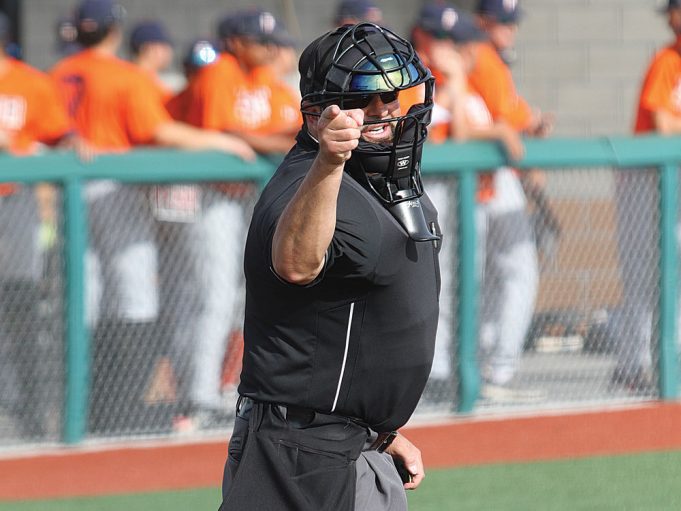Ispent years as an umpire assigner from Little League to major college and, of course, I worked for my fair share. All have pet peeves and most have the same ones. I’m sharing some today because I’m not sure that all umpires know what they are.
First, a few words about assigners. Most of those I’ve known were fair, but not all of them. Some had favorites to whom they gave the best games. Some ran things like a fiefdom. Some charged fees for assignments. A couple who were still working on the field held back newer umpires with potential whom they saw as threats. I hired two such up-and-comers in a collegiate conference in which I was coordinator, and both made the College World Series. They needed a break and weren’t going to get it locally. So you need to figure out who you’re dealing with.
Attitude matters. In one college game I asked a young umpire to switch with a crewmate with a health issue and take the plate. He grudgingly said OK but made a big deal of the fact he had worked one of the teams from behind the plate three times that season. I thought fine — if you want to balk, I’ll ask someone else. Another crew member — a veteran with years in pro ball — said no problem (good answer). When he heard about this, the younger guy said he’d do it, but I said too late — I had asked someone else and, by the way, he switched without complaint. Was I trying to send a message? You bet.
I didn’t expect people to kiss my rear, but it did bother me when someone did something I asked them to do or accepted an assignment but griped about it all the way. In contract law we call this a “grumbling acceptance” — you end up accepting an offer, but you make it clear how much you dislike it. If you’re new, this applies in spades; a reputation for being difficult or a prima donna acquired early in one’s career can have a long shelf life.
Repeated turnbacks are a big deal. We know that last-minute stuff happens, but often? If you do this, understand that at some point I may reduce my headaches by choosing a more reliable person to begin with. No one is so good that he or she is irreplaceable. Also, realize that your turnback may not be the only one I have to deal with that day. The more I have, the harder it may be to find replacements (especially today, with the number of officials falling), which makes the whole process time-consuming and onerous and reduces my patience level.
One guy turned back kid-ball assignments every few days. After a while I quit assigning him anything. When he asked why, I told him. He asked for another chance and it worked out. Which told me that some of his “can’t avoid it” cancellations weren’t so unavoidable after all. As the saying goes, I may have been born at night, but I wasn’t born last night.
Don’t let your assessment of how good you are make you complain about the caliber of games you get. Other umpires think they’re pretty good, too. I may share your opinion but just think that for whatever reason you’re not best suited for that game. My advice is to take what you get, keep quiet and work to the best of your ability. The last thing an assigner needs is a slew of divas working for him.
Some umpires don’t understand that many factors, about which they’ll likely know nothing, may affect the assignment process. Have you had one team often, especially recently? Has bad blood developed so that it may be best to keep you and a team apart for a while? Is the assigner getting orders from someone else? Does the assigner want to mix newer and veteran officials? Is the assigner spreading the cream so that everyone gets an even quota of top, mid-level and not-so-great assignments? Does the assigner feel the crew chemistry would be better by choosing someone else given the personality of who is already assigned for that game? And so on. So there may be sound reasons for assignments that, on the surface, don’t seem to make sense.
Game shopping is a flagrant offense. I’ve assigned for smaller-college conferences and had officials who also worked in larger ones. If I give you an assignment and you get a last-minute opportunity in a larger conference (not a lateral move), I’ll gladly replace you if you’re honest about what happened. I want to help people climb the ladder, just as assigners helped me. But if I find out that you lied and said you had a work or family issue to get out of my game and take someone else’s, you’ll pay down the road. And, because assigners compare notes, someone other than I may exact that payment.
Don’t belittle or tell me stories about other umpires to try to make yourself look better or try to kiss up; we assigners have been around the block a few times and can smell this stuff a mile away. And take it to the bank that trashing me behind my back will get back to me.
Now, most assignments are handled online. Don’t wait until the last second to accept or, worse, not accept by the due date. Assigners don’t like having to continually send out reminders about past-due acceptances, especially to the same people. I know a couple who, after one reminder one time, just replace that umpire with someone else when a due date passes.
In sum, assigners are human and can’t help but be affected by stuff that umpires do that causes us heartburn. Don’t be high maintenance, especially if your assigner isn’t the most patient person around. Above all, be 100 percent honest at all times. We’ll tolerate a lot of things, but dishonesty isn’t one of them.
What's Your Call? Leave a Comment:
Note: This article is archival in nature. Rules, interpretations, mechanics, philosophies and other information may or may not be correct for the current year.
This article is the copyright of ©Referee Enterprises, Inc., and may not be republished in whole or in part online, in print or in any capacity without expressed written permission from Referee. The article is made available for educational use by individuals.


















